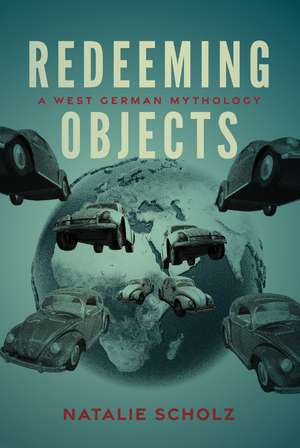Redeeming Objects: A West German Mythology: George L. Mosse Series in the History of European Culture, Sexuality, and Ideas
Autor Natalie Scholzen Limba Engleză Hardback – 12 sep 2023
Postwar advertising, film, and print culture sought to divest mass-produced goods—such as the Volkswagen and modern interiors—of their fascist legacies. But Scholz demonstrates that postwar representations were saturated with unacknowledged references to the Nazi past. Drawing on a vast array of popular and highbrow publications and films, Redeeming Objects adds a new perspective to debates about postwar reconstruction, memory, and consumerism.
Din seria George L. Mosse Series in the History of European Culture, Sexuality, and Ideas
-
 Preț: 119.08 lei
Preț: 119.08 lei -
 Preț: 166.01 lei
Preț: 166.01 lei -
 Preț: 338.36 lei
Preț: 338.36 lei -
 Preț: 144.97 lei
Preț: 144.97 lei -
 Preț: 143.79 lei
Preț: 143.79 lei - 19%
 Preț: 433.43 lei
Preț: 433.43 lei - 19%
 Preț: 437.17 lei
Preț: 437.17 lei -
 Preț: 264.90 lei
Preț: 264.90 lei -
 Preț: 297.44 lei
Preț: 297.44 lei -
 Preț: 282.91 lei
Preț: 282.91 lei -
 Preț: 154.26 lei
Preț: 154.26 lei -
 Preț: 246.19 lei
Preț: 246.19 lei -
 Preț: 231.53 lei
Preț: 231.53 lei -
 Preț: 250.82 lei
Preț: 250.82 lei -
 Preț: 246.19 lei
Preț: 246.19 lei -
 Preț: 306.34 lei
Preț: 306.34 lei -
 Preț: 305.90 lei
Preț: 305.90 lei -
 Preț: 131.04 lei
Preț: 131.04 lei -
 Preț: 279.45 lei
Preț: 279.45 lei -
 Preț: 181.22 lei
Preț: 181.22 lei -
 Preț: 189.96 lei
Preț: 189.96 lei -
 Preț: 251.23 lei
Preț: 251.23 lei -
 Preț: 188.60 lei
Preț: 188.60 lei -
 Preț: 315.95 lei
Preț: 315.95 lei - 23%
 Preț: 475.36 lei
Preț: 475.36 lei -
 Preț: 314.03 lei
Preț: 314.03 lei - 23%
 Preț: 482.44 lei
Preț: 482.44 lei - 23%
 Preț: 482.60 lei
Preț: 482.60 lei -

Preț: 462.20 lei
Preț vechi: 502.39 lei
-8% Nou
Puncte Express: 693
Preț estimativ în valută:
88.44€ • 92.35$ • 73.03£
88.44€ • 92.35$ • 73.03£
Carte tipărită la comandă
Livrare economică 15-29 aprilie
Preluare comenzi: 021 569.72.76
Specificații
ISBN-13: 9780299344306
ISBN-10: 0299344304
Pagini: 344
Ilustrații: 81 b-w illus.
Dimensiuni: 152 x 229 x 23 mm
Greutate: 0.59 kg
Ediția:First Edition
Editura: University of Wisconsin Press
Colecția University of Wisconsin Press
Seria George L. Mosse Series in the History of European Culture, Sexuality, and Ideas
ISBN-10: 0299344304
Pagini: 344
Ilustrații: 81 b-w illus.
Dimensiuni: 152 x 229 x 23 mm
Greutate: 0.59 kg
Ediția:First Edition
Editura: University of Wisconsin Press
Colecția University of Wisconsin Press
Seria George L. Mosse Series in the History of European Culture, Sexuality, and Ideas
Recenzii
“Scholz explores the afterlife of Nazism as a repurposing and remythologizing process. Scholars have yet to learn how to account for the ‘affective legacies’ of the Third Reich, or even to realize that they existed. Scholz’s analysis of the postwar fabric of Nazi myth showcases a subject and an approach that could be of great consequence for contemporary German and, more generally, post-totalitarian scholarship.”—Michael Geyer, University of Chicago
“A fascinating, meticulous, and seminal study. . . . Groundbreaking.”—Midwest Book Review
“Scholz is at her best when dissecting the Volkswagen Beetle and the transformation of West German interior design, showing convincingly how claims of ‘timeless’ design could replace unpleasant references to the Nazified patterns.”—CHOICE Reviews
“A fascinating, meticulous, and seminal study. . . . Groundbreaking.”—Midwest Book Review
“Scholz is at her best when dissecting the Volkswagen Beetle and the transformation of West German interior design, showing convincingly how claims of ‘timeless’ design could replace unpleasant references to the Nazified patterns.”—CHOICE Reviews
“An immensely rich and yet concisely written analysis, Redeeming Objects invites the reader to savour each page. Scholz’s text lingers at the symbiotic intersection of history and memory, deftly combining nuanced theoretical interpretation with rigorous archival research. . . . A fresh and insightful contribution.”
“Stimulating. . . . A rich rereading of West Germany’s early material culture, one that opens up a range of unsettling questions about how the ghosts of the past hid in plain sight at the time.”
“A well-written, persuasive, and, above all, engaging account of West German consumer culture in the early post-war years.”
“Highly engaging. . . . Scholz’s book is significant for its integration and careful examination of many media types and the seriousness with which it scrutinizes film and advertising as elemental initiators of our pasts, present, and futures.”
“Helpfully unites long-running scholarly discussions of Nazi continuities in the FRG with the history of consumer culture and postcolonial studies, while calling due attention to the affective and symbolic ambiguities of these objects.”
“This remarkable book offers a new way to conceptualize postwar West German history, which integrates familiar historical topics: sites of memory, the Nazi past, consumer society, racial ideologies, and imperialist imaginaries. What emerges is an uncanny whole, a broad perspective on the time period that should spark further historical studies. . . . Redeeming Objects offers a fresh take on postwar West German history but also a new way to think about other nations, other imaginaries, other traumas, other myths.”
Notă biografică
Natalie Scholz is a professor of modern and contemporary history at the University of Amsterdam.
